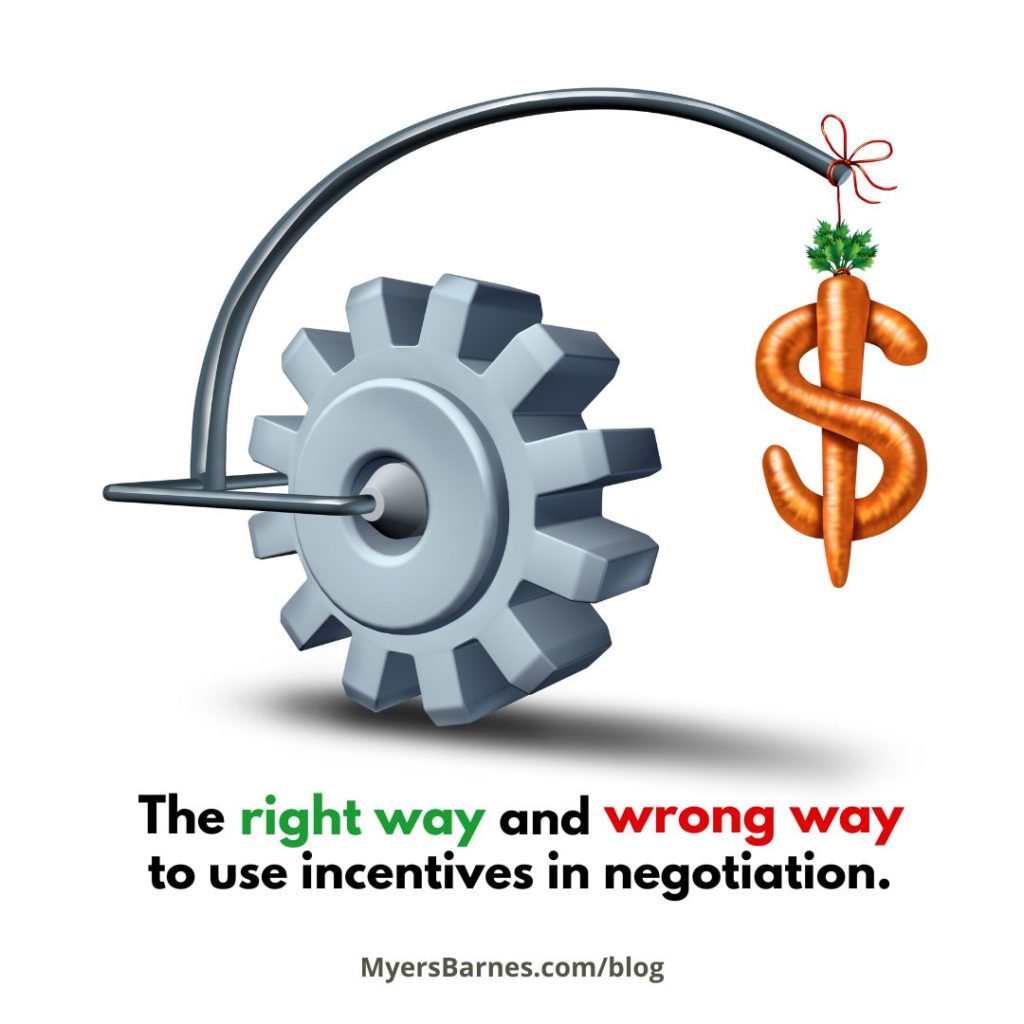 Discounting is the sign of desperation in negotiation. Too often, a new home sales professional feels cornered and jumps to offering a discount or extra incentive. There’s a time and place for those to be effective. Here’s the right way and the wrong way to use incentives in negotiation when you’re selling a new home.
Discounting is the sign of desperation in negotiation. Too often, a new home sales professional feels cornered and jumps to offering a discount or extra incentive. There’s a time and place for those to be effective. Here’s the right way and the wrong way to use incentives in negotiation when you’re selling a new home.
Save it for closing, not opening a negotiation.
An incentive should never be used when you’re just starting your conversation with a prospective buyer. More times than I can count, the builder gives the salesperson an incentive to use AS NEEDED. This enticement then flies out in the open, rather than being held for leverage later.
Here’s an example of what NOT to do:
“Welcome to our model. As you look at our homes today, please keep in mind that we’re offering $20,000 in free upgrades and will also pay for your closing costs.”
First of all, it’s not “free”. You just took a big slice out of the builder’s profit, for no reason whatsoever.
Secondly, by quickly handing out the concession, you sparked the idea in the buyer that there could be more to gain, since this was offered so freely.
Don’t sell the deal before you sell the home.
You must establish the value of any product before you start amending the price. If you discuss incentives before showing a new home, you haven’t yet established a basis for the value. They don’t have an understanding of what the home is worth so whether you’re offering $5,000 in closing costs or $20,000 in upgrades, they don’t have the perspective to appreciate the offer you’re extending. It’s like telling someone, “I’ll give you 50% of something.” 50% of what? There’s nothing yet that gives meaning to the offer.
Deflect the discussion and keep control.
A buyer walks into your model and immediately asks, “What are you offering for incentives?”
Don’t feel compelled to tip your hand. Instead, respond like this:
“I’m glad you asked. To start with, we offer impressive, award-winning homes, a desirable location, and a great school district. Plus, our personal service is second to none.”
The prospect comes back with, “Sure, but what else are you offering if I decide to buy one of your homes?”
“We have a lot to offer. When you find the home you want to own, we have financing incentives. We do have additional incentives, but they don’t apply across the board. They can differ from one home or community to the next, and also can depend on your timeframe for moving. Before we talk about those opportunities, the first step is to select a home you really like and then we can discuss the incentives.”
Don’t position it as a price apology.
Any incentive to a buyer offered too soon can come across as a price apology. It can be perceived that you overpriced the home and now need to find a way to make up for that “mistake”.
Instead of going the “mea culpa” route, use your confidence in the product to sell the home, its features, the community, the builder, and the amenities. Communicate the undeniable value of the home. Cultivate the buyer’s desire to own and live in a home as exceptional as this one.
When they’re convinced, use the negotiating tool you’ve saved for closing the new home sale. “I’m so glad you’re interested in purchasing this home. Now, let me tell you what we can offer to increase its value even more.”
Wait until it’s asked for.
You might find that you never have to mention incentives to a buyer. Don’t offer that information before the prospect asks about incentives (as mentioned above, even be careful if it’s questioned too soon in the process). If you toss it out too soon, you could create a doubt about the home. “Why are they offering discounts? What’s wrong with the house that they have to offer a bribe for me to buy it?”
Know your buyer’s expectations.
The purchase of a home is a major investment. It makes perfect sense that your prospective homebuyer wants every possible incentive or discount. However, they might be perfectly happy without the full extent of what you could possibly offer.
Before discussing incentives with your buyer, get to know their priorities. Explore what they want, what they can afford, and how much of a concession you need to make. When the incentive matches their expectation, the negotiation will come to a successful close for both parties.
Before you launch into any concession discussions, be absolutely clear about the right way and the wrong way to use incentives in negotiation. While you’re at it, put some time into sharpening your negotiation skills. It’s a must-have sales skill for every new home sales professional, particularly during the current housing market shift. If you need help with becoming a strong negotiator, reach out to me for help with sales training. And stay connected to learn more about my upcoming book on this subject!


